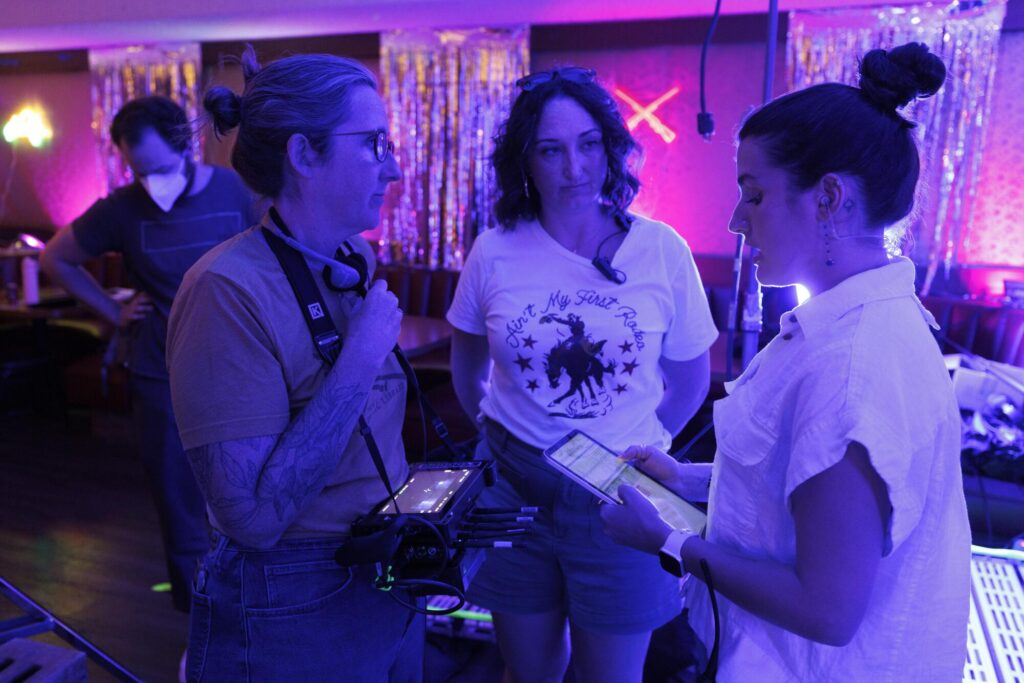An accessible set for all requires intention. There are practical needs, of course — ramps for restrooms and extra-bright neon tape on the ground to better light up and mark cues and equipment for low-vision performers and crew members. But there’s also a need to weave accessibility into the production so seamlessly that it doesn’t feel tacked on or burdensome.
On a sweltering day in June at the Van Nuys Elks Lodge, the cast and crew of “The Hog Queen,” a short film starring “Wicked: For Good’s” Marissa Bode, were doing just that: re-creating a drag show at a small-town Texas gay bar, yes, but also modeling what a set that puts accessibility and inclusion at its center can look like.
“I have been lucky in the way that ‘Wicked’ was an incredibly accessible set,” Bode tells me later over Zoom, looking back on her experience making writer-director Katherine Craft’s short horror film. “I didn’t really have to think at all about my own accessibility. However, I know that’s not the same for all my disabled peers.”
Nor is it common practice on any given set.
“Honestly, even prior to ‘Wicked,’ the No. 1 question I’m always asking when I’m collaborating with somebody is, ‘Have you worked with disabled people before? If not, how are you accommodating for that?’” Bode says. “Even when I signed on to my agency — or even my PR team, or even my manager — that was one of the first questions I asked. That’s always at the top of my mind.”
That’s what made “The Hog Queen” so rewarding. This was a production that made accessibility a priority. “I just felt taken care of in a way with this process that I have not in others,” Craft says.
Craft’s short film is part of Inevitable Foundation’s Visionary Fellowship. The yearlong program, supported by Netflix, was designed as an incubator for disabled filmmakers. Since its founding in 2021, Inevitable Foundation has supported disabled writers at various stages of their careers. But with this latest and most ambitious fellowship, founders Richie Siegel and Marisa Torelli-Pedevska wanted to put the emphasis on directors with feature-length projects ready for production.
Director Katherine Craft, left, producer Shelby Hadden and assistant director CJ Palmisano go over logistics for a scene on the set “The Hog Queen.”
(Carlin Stiehl / Los Angeles Times)
Each of the projects selected has been carefully scaled down to a short length to guarantee they could be produced within the yearlong fellowship; all five are set to be unveiled at a showcase in November.
Craft and the other members of the fellow inaugural Visionary cohort — Zayre Ferrer, Monica Lucas, Filipe Coutinho and Alys Murray — each received $55,000 in funding for their respective short films, including a production grant, health insurance, access to an experienced crew as well as marketing support and financial aid for access and travel.
Rather than merely focusing on mentorship, networking or community-building, the Visionary Fellowship was designed to give these filmmakers the production experience they’ll need to thrive in the industry. More than just a pipeline, the 12-month program is an explicit investment in disabled filmmakers and the stories they’re eager to tell. And to arm them, in turn, with an encouraging environment that aims to reframe the way accessibility is often understood.
“I think there’s this misconception that making a set accessible is going to be a huge pain in the ass, that it’s going to cost a ton of money, and it’s going to slow you down,” Craft, who has low vision, explains. “I don’t think any of that has to be true. The other thing is people think of it as something that is going to benefit someone else. But when you start looking at it through a lens of accessibility and inclusivity, you’re benefiting everyone.”
1. Bode makes her way onto the set. 2. Christian Zamudio performs during a drag show scene. 3. The slate lights up with a digital time code. (Carlin Stiehl / Los Angeles Times)
Siegel and Torelli-Pedevska knew they needed to bake that philosophy into their process. That meant setting money aside for any accommodations early and having a line item for accessibility in the budget templates they were creating to make sure it was something they could anticipate, measure and track.
“A lot of it goes to starting early,” Siegel says. “But more importantly, it’s about rejecting the belief that [accessibility] comes at the expense of the creativity in the final product. Saying the opposite, in fact, which is: if everyone feels like this is a safe set and they can do their best work, the work will just be better.”
Bode agrees — and sees Inevitable Foundation’s approach as one that can be replicated across the industry.
Before shooting, the entire cast and crew of “The Hog Queen” received a form that sought to garner information about their needs. “It asked about everything under the sun in terms of disability,” Bode explains. “‘Do you get overstimulated? Would you need a room to go to if you do get overstimulated? What are your physical access needs? Do you need a ramp? Do you need this? Do you need that?’
“I really think that should just be standard on sets. I don’t think disability accommodations are a luxury. I think everybody should be taken care of.”
